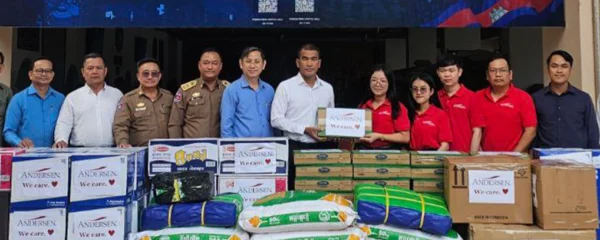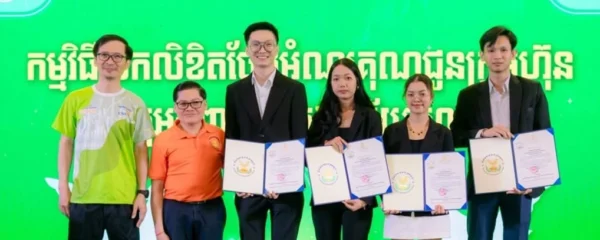
Implications of Cambodia joining the WTO Fisheries Subsidies Agreement
March 14, 2025
Introduction
Cambodia’s accession to the WTO Fisheries Subsidies Agreement (“FSA”), almost exactly one year ago, stands as a recent example of its policy to pursue an international trade posture that is more in line with sustainability, and Cambodia as an open, fair and transparent place to do business in and with. It is aligned with a policy of reducing tension with environmental and trade policies of the European Union (“EU”) as Cambodia continues to work on its domestic administrative architecture to comply with international requirements in terms of marine conservation and improve its track record, particularly in relation to the EU, on the issue of illegal, unreported and unregulated fishing (“IUU”).
We take advantage of the one-year anniversary to highlight this development, and to investigate the possible implications for this coastal state from its new commitments if and when the FSA comes into force.
An Environmentally Inspired WTO Agreement
Subsidies are perhaps the most difficult issue in international trade. As part of the Uruguay Round that transformed the GATT and established the WTO, a lightyear jump was accomplished by for the first time really defining what a subsidy is, and giving access to a binding dispute settlement mechanism. But the accomplishment of the Anti-Subsidies and Countervailing Measures Agreement (“ASCM”) (and the Agreement on Agriculture) cover only goods, not services, and do not apply to fisheries. The FSA is a landmark environmentally inspired multilateral trade agreement within the WTO suite of instruments. It was created by the Ministerial Conference 12 of the WTO in 2021 as a means of pursuing several of the Sustainable Development Goals (“SDG”). Notably, SDG 14.6 states as follows:
By 2020, prohibit certain forms of fisheries subsidies which contribute to overcapacity and overfishing, eliminate subsidies that contribute to illegal, unreported and unregulated fishing and refrain from introducing new such subsidies, recognizing that appropriate and effective special and differential treatment for developing and least developed countries should be an integral part of the World Trade Organization fisheries subsidies negotiation.
So, the context is just as much one of international trade, notably organizing global trade in fisheries that is as free as possible, as it is one of sustainability, particularly addressing IUU and overfished stocks.
What is Targetted Under the WTO Agreement?
The focus of the FSA is on subsidies. This term may recall programs where Governments hand out cash grants to private companies, and that is indeed included, but subsidies as defined in the ASCM (referred by the FSA) goes well beyond such scenarios. As per the ASCM, a subsidy can involve a direct transfer of funds (e.g. grants, loans, and equity infusion), potential direct transfers of funds or liabilities (e.g. loan guarantees), but also in case of government revenue that is otherwise due is foregone or not collected (e.g. tax exemptions or incentives). Also within the potential scope are situations where a government provides goods or services other than general infrastructure, or purchases goods, or when a government makes payments to a funding mechanism. It is also possible that some of these functions are carried out by a private body, under certain circumstances. It is in all instances required that a benefit is conferred on the beneficiary.
So, many situations may give rise to a subsidy, depending on the circumstances and condition of a benefit. A Government not collecting taxes owed as per the law, or exempting one or more enterprises from taxes may be a subsidy. A Government buying goods from an enterprise or industry may be a subsidy. Or the other way around, a Government providing goods or services to an enterprise or an industry may be seen as a subsidy. Interest free or low-interest loans, or guarantees may be subsidies. Price interventions may also constitute subsidies.
Just because it is a subsidy does not mean that other WTO Members can apply countervailing measures because under the ASCM this is only provided for prohibited and actionable subsidies, not all for subsidies. But it does mean that the potential exists for trade remedies to be applied should indeed the subsidies fall within those two categories.
IUU and Overfished Stock
A recent OECD study found that various government aid to fisheries can be crucial to bring about effective fisheries management. But, Governments that “make it easier and cheaper to fish can drive overfishing and illegal fishing, particularly where fisheries management is weak”.
The study found that more than 40% of support policies in OECD states and up to 90% in non-OECD states (possibly such as Cambodia) have a risk of encouraging overfishing and illegal fishing (OECD Review of Fisheries 2025, OECD Publishing, Paris).
The FSA does not address all subsidies in the fisheries sector, only the following:
- ‘No Member shall grant or maintain any subsidy to a vessel or operator5 engaged in illegal, unreported and unregulated (IUU) fishing or fishing related activities in support of IUU fishing’ (art. 3.1. FSA) and
- ‘No Member shall grant or maintain subsidies for fishing or fishing related activities regarding an overfished stock’ (art. 4.1. FSA).
Accordingly, there has to be a determination made to ensure that a vessel or an operator is indeed engaged in IUU or overfishing of stock. This determination of IUU can be made by coastal members. For example, Cambodia as a coastal state might make such a determination based on objective information and under procedures set out in the FSA about vessels that come and fish in its Exclusive Economic Zone (“EEZ”). Flag states or by Regional Fisheries Management Organization or Arrangements (“RFMO”) such as the Southeast Asian Fisheries Development Center (“SEAFDEC”) and the Western and Central Pacific Fisheries Commission (“WCPFC”) may also make this determination.
The determination that a stock is overfished is to be recognized by the coastal member or by the relevant RFMO and must be based on scientific evidence.
Timing
Cambodia will be able to benefit from a 2-year exemption on dispute settlement procedures started by other Members but only with respect to fishing that happens within its own EEZ. Cambodia measures that relate to outside its EEZ, if any, may be challenged by WTO Members immediately from the moment the FSA enters into force.
The FSA has not yet entered into force at the time of writing. It requires 2/3rd of the WTO Members to sign on it to enter into force. At this time, another 30 or so Members are still needed.
Defensive: Which Practices in Cambodia May Be Within the Scope of the FSA?
First of all, challenges can only be expected after a determination has been made of IUU or overfishing. But if we assume that is bound to happen at some point, it seems one of the main practices that might be challenged relates to the enforcement of tax laws. Although Cambodia’s tax system requires registration for income tax and value added tax assuming a certain volume of revenue, enforcement in general and in the agriculture and fisheries sector has been unclear, and rife with various exemptions. This could be a first angle for other WTO Members in the region seeking to mount some kind of a challenge against Cambodia under the FSA.
Offensive: the FSA Gives Cambodia the Legal Tools to Better Protect Its Overfished Waters
Cambodia’s waters suffer from IUU from both domestic and foreign sources. For instance, fishing trawlers that operate at night in marine reserve areas can be particularly harmful. Other instances of IUU are the use of nets with too small meshes, fishing without permits, fishing of protected species in protected areas, and unregulated transfers at sea. The improvement of domestic monitoring infrastructure is an important part of Cambodia’s policy priority.
As a signatory of the FSA, it has an additional firm legal basis and a binding dispute settlement mechanism to curb foreign sourced vessels and operators that engage in these adverse activities. To do so effectively, Cambodia should keep updated on the wide range of policies and practices that other countries in the region maintain so that it may be in a good position to protect its interests under the FSA.
Recent Publications
Recent News

Andersen in Cambodia donates to the refugee relief effort
Read More »
Andersen Cambodia Recognized by SERC for Contributions to Capital-Market Development
Read More »
Edwin Vanderbruggen Attends MAP Day in Lausanne
Read More »


